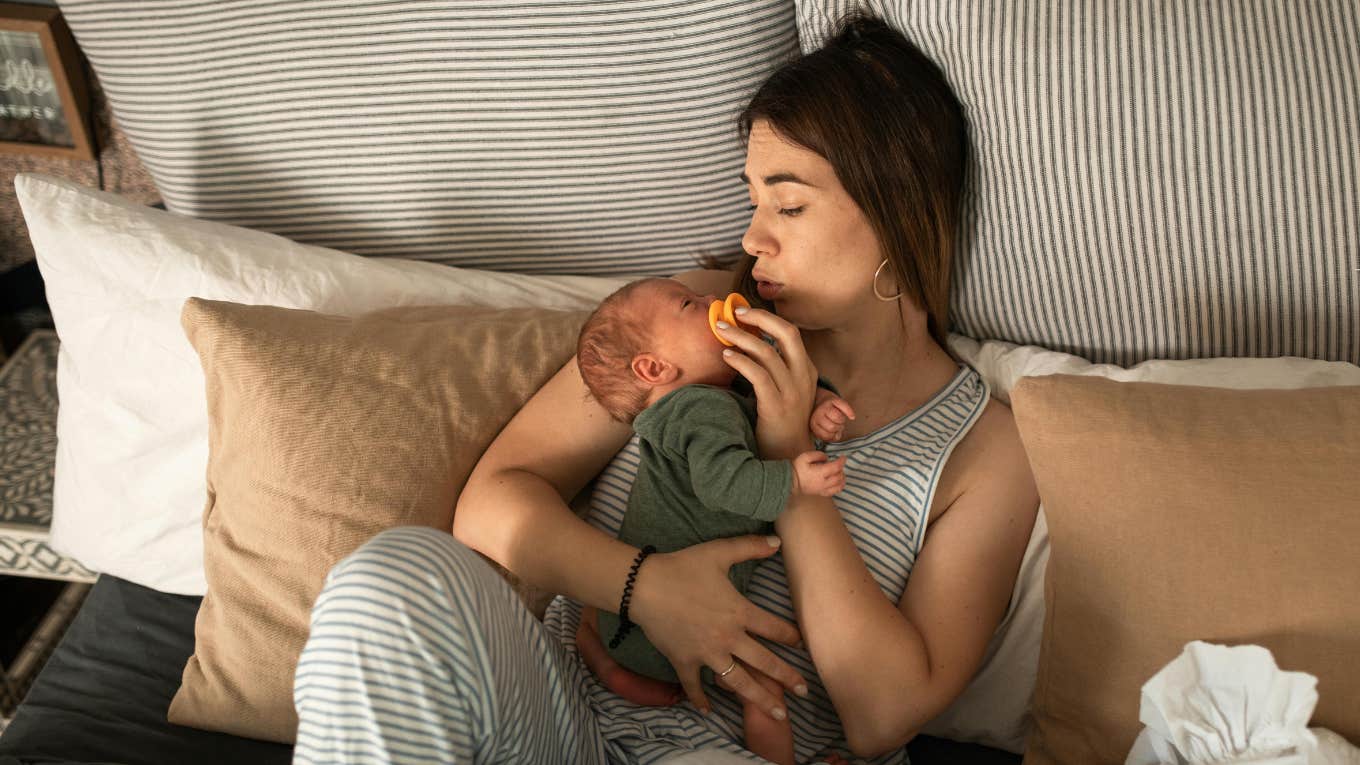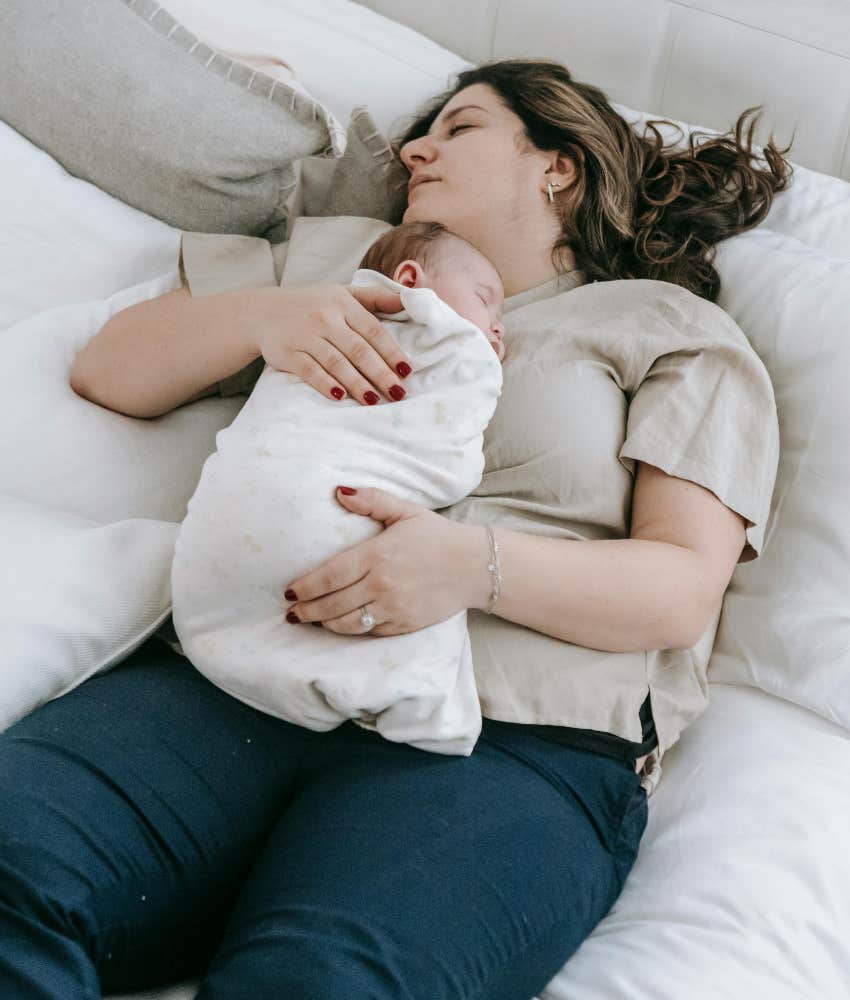Husband Follows Wife Into Shower A Week After She Gave Birth, Calls Her ‘Fat’ & Says Her Stomach Shouldn’t Poke Out
His cruel words signified a much larger issue.
 RDNE Stock Project / Pexels
RDNE Stock Project / Pexels After giving birth, a new mom needs to focus on healing her body and bonding with her baby, both of which require rest, a calm environment, and support from the people around her.
The last thing she should worry about is what she looks like — after all, being pregnant for nine months inevitably changes your body, and labor is called labor for a reason.
One new mom shared the cruel way her husband insulted her, showing how emotional abuse can present itself after having a baby.
The woman’s husband followed her to the shower a week after she gave birth, called her ‘fat’, and said that her stomach shouldn’t poke out.
Belle Blake recorded herself from the front seat of her car, tearfully sharing her husband’s abusive behavior when she was one week postpartum.
“I just gave birth to our baby a week ago, and he followed me into the shower and started pointing at me while I’m standing there naked, screaming at me and telling me that I am fat and I need to lose weight and not have my stomach poke out,” she said.
It takes about six to eight weeks for the uterus to return to its pre-pregnancy size. Women can also experience birth complications that impede their healing process, such as diastasis recti, the separation of the abdominal muscles that causes a new mom’s belly to stick out.
Blake took a deep breath as though she were trying to center herself, then continued telling her story.
“I did the laundry today and I folded my husband’s clothes, and I hung everything that needed to be hung up on hangers, and I put it on the bed," she said. "Tonight, when he got home, I asked him to please put everything away so we could go to bed, and I was gonna take a shower."
“I have our 1-week-old baby sitting in his bouncer,” she continued. “He followed me into the shower and pulled back the curtain and just stood there and screamed at me, pointing at me, and saying that I was fat and I needed to lose weight and if I wasn’t gonna do that, that I shouldn’t tell him what to do."
Aside from what their doctors recommend, new moms shouldn’t hurry their bodies to change before they’re ready, as too much physical activity can lead to excessive bleeding or injury. New moms are advised not to lift anything heavier than their baby, which includes laundry baskets full of clothes.
Blake shared her story of postpartum abuse to raise awareness for the ‘Safe At Home Program.’
After describing the verbal and emotional abuse she was subject to after having a baby, she offered a disclaimer, saying, “This is a reenactment of something that happened to me in my previous marriage, to raise awareness about the ‘Safe at Home Program,’ also known as the ‘Address Confidentiality Program.’”
According to Blake, the California program “provides a decoy address to victims of domestic abuse and sexual assault. You do not have to go through a judge to get it. You can get one through a licensed professional, like a therapist or a caseworker.”
She noted how emotionally charged the reenactment was for her, saying, “I remember how vulnerable I was at the time after I had my first child and how truly horrible it was to be treated like this, and this was one of the first instances of me realizing that there was something wrong, something wrong with this relationship.”
In a separate post, Blake explained why she structures her posts as though they’re happening in real-time despite being dramatic reenactments.
“My stories are real; they happened to me. I tell them like they’re happening in real life so that they reach more viewers so that more people know about the Safe at Home Program.”
“I wish I could say that it was a parody or that it was a joke or satire or it was all made up,” she said. “Unfortunately, they’re real, and I went through this. I went through abuse in my childhood and then in my young adulthood because I didn’t know any better.”
“These were some of the moments in time where I didn’t even realize that it was abuse, but it was,” Blake said.
“Abuse always starts as disrespect, and it ends in violence,” she added, noting that “it’s a lot harder to leave somebody” years into an abusive relationship.
For women in abusive relationships, the postpartum period can be especially fraught. The National Domestic Violence Hotline reported that women who experience abuse after childbirth are at higher risk for postpartum mood disorders, such as depression, anxiety, and complex PTSD.
The National Resource Center for Domestic Violence reports that most existing studies have documented a lower prevalence of violence during the nine-month period of pregnancy than during the first 12 months postpartum.
 Sarah Chai / Pexels
Sarah Chai / Pexels
They referenced a study from 2005, which noted that homicide was the second leading cause of injury-related death during pregnancy and the first year postpartum in the U.S. from 1991 through 1999.
Studies have also shown that domestic violence in the initial six months of the postpartum period ripples outward, negatively affecting the relationship between a mom and her baby. Domestic violence is associated with higher levels of child neglect and psychological and physical abuse during the first five years of a child’s life.
Creating a safety plan, including speaking to a trusted medical provider or having a support person stay in your home postpartum, is one way to put some protections in place.
Abuse is a cycle that can be broken. The first step is recognizing the abuse for what it is and voicing it out loud, as Blake herself has done, without shame, to help other moms seek safety.
If you or someone you know is in need of support during pregnancy or postpartum, contact Postpartum Support International for help.
Alexandra Blogier is a writer on YourTango's news and entertainment team. She covers social issues, pop culture, and all things to do with the entertainment industry.

